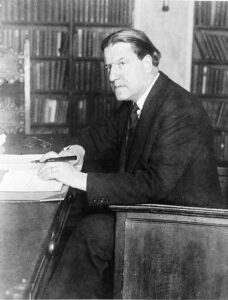
Stephen S. Wise (March 17, 1874-April 19, 1949) was born in Budapest, the grandson of Haredi Rabbi Joseph Hirsch Weiss and the son of Rabbi Aaron Wise, who moved with his family to New York and became the spiritual leader of Congregation Rodeph Shalom, a Reform congregation in New York. Steven Wise attended public schools, then graduated cum laude with a bachelor’s degree from the College of the City of New York in 1892. Rabbinic ordination came the following year from Rabbi Adolph Jellinek, and a doctorate degree was awarded by Columbia University in 1902.
The same year he was ordained, Wise became the rabbi at Congregation B’nai Jeshurun in Manhattan, saying there until 1900 when he accepted the pulpit at Congregation Beth Israel in Portland, Oregon. In 1906, he announced he would not accept an appointment as rabbi at Temple Emanu-El in New York City because at that congregation the board of directors required sermons to be submitted in advance to them for approval. Instead, he started the Free Synagogue in New York City, in which the rabbi was free to speak his mind and there would be no pews and no dues. The synagogue was established in 1907 and Wise remained its spiritual leader until his death, after which the members voted to rename it as the Stephen Wise Free Synagogue.
In 1897 he helped to found the national Federation of American Zionists, a forerunner of the Zionist Organization of America. He attended the Second Zionist Congress in Basel in 1898, serving as its secretary for the English language. In 1901 Wise and his wife Louise Waterman had their first child, writer James Wise. Two years later, their daughter, Justine Wise Polier, followed. She would become the first woman Justice in New York
In 1917, Wise participated with Louis Brandeis and Felix Frankfurter in persuading President Woodrow Wilson to support the Balfour Declaration that viewed with favor the establishment of a Jewish national home in mandatory Palestine. In 1918, he participated in the initial meeting of the American Jewish Congress in Philadelphia. A sermon he gave about Jesus the Jew, whom he described as a “great moral and ethical teacher” prompted condemnation from the Union of Orthodox Rabbis and Wise’s decision to resign as chairman of the United Palestine Appeal.
In 1922, Wise founded the Jewish Institute of Religion to train Reform Rabbis. After Wise’s death, the JIR merged with Hebrew Union College. As a delegate from New York to the 1924 Democratic National Convention, he offered the invocation at the opening of the sixth session. In 1933, Wise led efforts for a Jewish boycott of Germany. In 1936, Wise became the inaugural president of the World Jewish Congress, in which position he remained until his death.
In 1938, while serving as president of the American Jewish Congress, he opposed a recommendation from the Department of the Interior that Jewish refugees from Germany and Austria be settled in Alaska, then a territory. He said if adopted, the plan would arouse suspicion that Jews are trying to take over part of the country. The plan was dropped after President Roosevelt indicated his disapproval.
Wise and Albert Einstein became friends after the latter’s immigration to the United States and Wise also was a friend of President Franklin D. Roosevelt. In 1942, upon confirmation by U.S. Undersecretary of State Sumner Welles of a report by World Jewish Congress representative Gerhart M. Riegner, Wise held a news conference that the Nazis wanted to murder all European Jews and that so far two million had been put to death. During his lifetime and long afterwards, Wise was widely criticized for not doing enough to save European Jewry.
Wise is buried in an unmarked mausoleum in Westchester Hills Cemetery in Hastings-on-Hudson, New York.
Tomorrow, March 18, Deborah Lipstadt
*
SDJW condensation of a Wikipedia article.